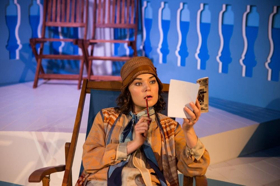Review: THE LADY WITH A DOG, Tabard Theatre

![]() Adapting Chekhov is quite the challenge - the Russian master's genius was built on a subtle alchemy of comedy and tragedy, psychological insight and intelligent entertainment, subtle wit and piercing wisdom. Mark Giesser (whose Bell, Book and Candle was a highlight at the much missed Greenwich Playhouse) recognises the responsibilities taking on Chekhov demands and, with a dancer's grace, solves them perfectly in this marvellous little production, recently transferred from The White Bear to The Tabard.
Adapting Chekhov is quite the challenge - the Russian master's genius was built on a subtle alchemy of comedy and tragedy, psychological insight and intelligent entertainment, subtle wit and piercing wisdom. Mark Giesser (whose Bell, Book and Candle was a highlight at the much missed Greenwich Playhouse) recognises the responsibilities taking on Chekhov demands and, with a dancer's grace, solves them perfectly in this marvellous little production, recently transferred from The White Bear to The Tabard.
Giesser's masterstroke was to relocate the action to mid-1920s Britain (coincidentally allowing Giulia Scrimieri to design some gorgeous costumes and Oscar Selfridge to leave a few Art Deco motifs and props around the pleasingly sparse set, the aesthetic treat worth the ticket price alone). While Europe's polity and economy are disintegrating in the face of the pressures of the Treaty of Versailles - the parallel with today's preoccupations all too clear - placing our lovers in the aftermath of The Great War solves a couple of narrative issues with a wonderful piece of legerdemain.
Forty-something Damian could oh so easily be a predatory, powerful cad, a heartless ladykiller with a stream of conquests behind him - and, in many ways, he is. But his experiences in the trenches gives him, if not quite an excuse, then certainly a reason, for his annual trips to the seaside for seduction and sex. It also bleeds a melancholy into his character, something that Richard Lynson brings out slowly as we get to learn a little more about the man behind the linen suit, the panama and the excess of self-esteem. What could so easily be a one-dimensional caricature blossoms into a fully rounded man - one full of human failings.
The object of his ardour, Anne (beautifully played by Beth Burrows in one of the most award-worthy performance I've seen so far this year), also makes more sense as a product of World War I. Marrying her husband, Carl, seems initially to be an absurd decision, out of character for this coquettish, clever, capable young woman, but her dilemma is that his availability as an eligible bachelor is largely the product of all the things she comes to despise about him: his highly convenient eye infection that got him sent home from his desk job in Picardy; his small-town attitudes and smothering self-satisfaction; his ambition to become an MP, but simply for the sake of the status so conferred (and, perhaps, legitimacy too). Ultimately, though, what was a girl to do?
The principals get fantastic support from Laura Glover as Elaine, Damian's sardonic, sniping wife who has made her peace with his philandering ways, but isn't about to make life easy for him, jabbing away at his weaknesses as she serves Pimms in the garden. Duncan MacInnes excels as Carl, another man whom it would be easy to caricature as a cuckholded fool or pathetic coward, but who emerges as a person who knows his limits with his wife, knows her needs and colludes in a fallacy that gives each what they, if not quite want, then definitely need. A fourth subtle and charismatic performance from this superb cast.
Roll in some seamless breaking of the fourth wall, scenes played out in the characters' minds and the ever-present Chekhovian high wire act navigating between the comic and the tragic, and we have a gem of a show in a venue that can be difficult, but has never worked more sympathetically with its production. See it to discover the potential of fringe theatre and, either afresh or anew, just how incandescently brilliant a writer Anton Chekhov was.
The Lady With A Dog continues at the Tabard Theatre until 7 April.
Photo Andreas Lambis
Reader Reviews

Videos
